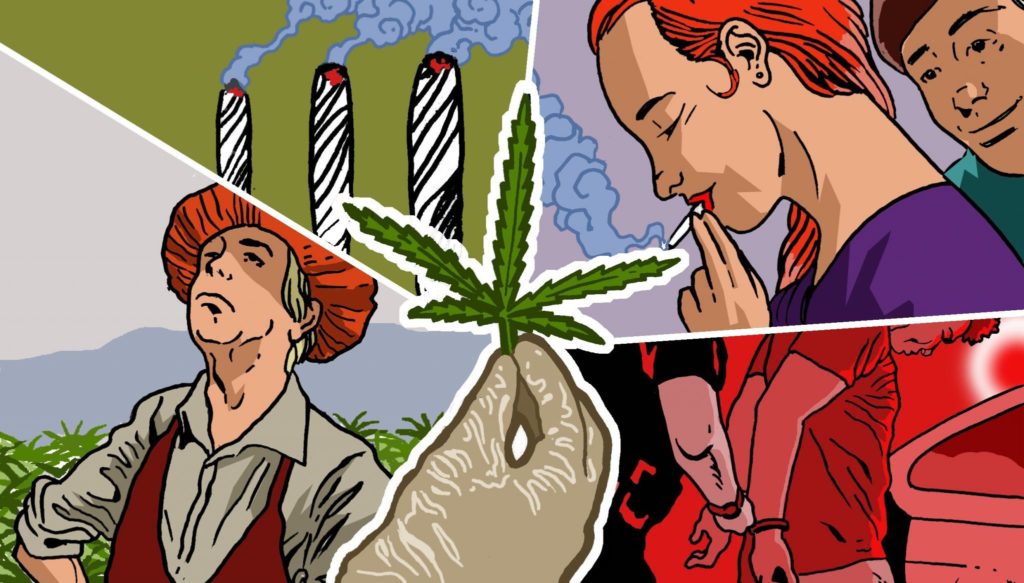High Times Series
High Times: A New Series Looks at How Legalizing Marijuana Would Transform California
As California voters prepare to make a historic decision about legalizing the recreational use of marijuana, promises and omens have become part of the debate.

As California voters prepare to make a historic decision about legalizing the recreational use of marijuana, promises and omens have become part of the debate over the state’s future if Proposition 64 is passed. Will the traditional small-time pot farmers be replaced by industrial grow operations? Will employees in this newly legalized commerce receive decent pay, working conditions and benefits? Or will the new cannabis worker have more in common with the low-wage, immigrant farm laborers who toil in California’s fields and orchards? Will a highly regulated, inspected and lab-tested product push the black marketers out of business or make underground marijuana a cheaper alternative? And will the taxes on pot that will finance the machinery of regulation also be enough to finally redress the 40-year fiscal drain imposed by Proposition 13?
This week Capital & Main looks at these and other aspects of the Adult Use of Marijuana Act:
- Piper McDaniel examines how one small community in rural Northern California, whose residents turned to illegal marijuana growing in order to escape the region’s poverty, faces an uncertain future if legalized cannabis inaugurates an era of industrial pot production. Meanwhile, the county sheriff’s department, with its eight deputies, can barely keep up enforcing state drug laws. See: High Times — The Hidden Poverty in Marijuana’s Black Market.
- Judith Lewis Mernit hears from experts about a little-known aspect of illegal marijuana cultivation – the brutal environmental damage it has inflicted, from growers’ diversion of rivers and creeks to the degradation of other waterways that are home to endangered salmon. See: Marijuana Growing and the Environment.
- Melissa Chadburn sorts out the hype from reasonable expectations about Proposition 64. Will California see the kind of economic windfall experienced by Colorado, which legalized pot in 2012? Why would the estimated 80 percent of California pot users who are considered heavy users switch from black market products to higher-priced legal marijuana? And if they stick with outlaw pot, can the new legitimate industry sustain itself in the first critical years of legalization? See What Happens If Marijuana Is Legalized?
- Judith Lewis Mernit looks at the potential for a brand-new legalized industry to get labor issues right the first time — not only with wages and job security, but in workplace safety. Even in states where some marijuana usage is legal, cannabis workers are subject to banned pesticides, carpel tunnel injuries and incredibly long work shifts during harvest season. Pot’s Wild West days of topless bud trimmers may be nearing their end with Proposition 64, but, as one person tells Lewis Mernit, with the right rules a legalized industry could “form the backbone of a new labor market in this country.” See: How Will Budtenders and Trimmigrants Fare If Pot Is Legalized?
- Pandora Young’s photographs capture scenes from two medical marijuana dispensaries – one, a union shop – in downtown Los Angeles and in Sherman Oaks.
-

 Latest NewsApril 3, 2024
Latest NewsApril 3, 2024Tried as an Adult at 16: California’s Laws Have Changed but Angelo Vasquez’s Sentence Has Not
-

 Latest NewsApril 17, 2024
Latest NewsApril 17, 2024Despite Promises of Transparency, California Justice Department Keeps Probe into L.A. County Sheriff’s Department Under Wraps
-

 Latest NewsMarch 20, 2024
Latest NewsMarch 20, 2024‘Every Day the Ocean Is Eating Away at the Land’
-

 State of InequalityApril 4, 2024
State of InequalityApril 4, 2024No, the New Minimum Wage Won’t Wreck the Fast Food Industry or the Economy
-

 State of InequalityApril 18, 2024
State of InequalityApril 18, 2024Critical Audit of California’s Efforts to Reduce Homelessness Has Silver Linings
-

 State of InequalityMarch 21, 2024
State of InequalityMarch 21, 2024Nurses Union Says State Watchdog Does Not Adequately Investigate Staffing Crisis
-

 Latest NewsApril 5, 2024
Latest NewsApril 5, 2024Economist Michael Reich on Why California Fast-Food Wages Can Rise Without Job Losses and Higher Prices
-

 Latest NewsMarch 22, 2024
Latest NewsMarch 22, 2024In Georgia, a Basic Income Program’s Success With Black Women Adds to Growing National Interest




















